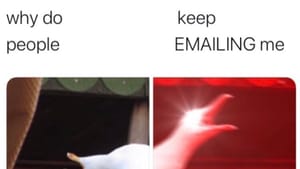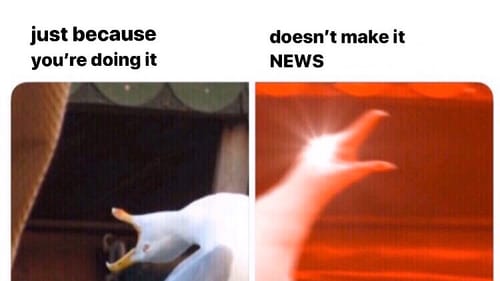Stay in the Loop
BSR publishes on a weekly schedule, with an email newsletter every Wednesday and Thursday morning. There’s no paywall, and subscribing is always free.
Here’s how to be one in a hundred
An editor’s public-relations tips for emerging independent artists

Coming out of another Philly Theatre Week, and looking ahead to SoLow Fest, the Fringe, and everything in between, I’m realizing that independently produced arts events continue to explode in Philly. Everyone wants a piece of media coverage—usually at the same time as everyone else.
I’ve written about public relations pitfalls, but what about the folks doing PR who aren’t PR professionals? Even without events like Philly Theatre Week, media folks are inundated with pitches, requests, and invitations—many from emerging independent artists who have no formal experience in PR.
I used to brace myself every August for an onslaught of the year’s most unorthodox PR in advance of the Fringe. But these days, independent artists seem to be producing year-round. Don’t they know they’re unlikely to get coverage just by sending a couple mass emails with some kind of press release attached?
No, they don’t know—and why should they? They’re artists, not professional promoters. So let’s make life easier for everyone, with tips for self-producing, self-promoting artists who are somewhat fresh to the business.
Realize the volume you’re up against
Philly Theatre Week 2020 was February 6 through 16. I just looked back at my inbox for the two-week period directly preceding that. As a conservative estimate, there were more than 100 local arts-and-culture pitches (i.e., story suggestions), invitations, and press releases addressed directly to me or BSR in that period—in just one of my inboxes. And that’s not counting writers’ pitches, or hundreds of emails from other promoters every week. In short, we do our best, but only a fraction of the pitches we get will actually become stories.
So you can also understand why email subject lines like “For Inclusion in Broad Street Review,” “fyi/theater news,” or “Article/review for Theater Section” (all of which are actual PR emails I got during last year’s Fringe) get buried instantly.
Cultivate relationships, not lists
There are many simple ways to build meaningful relationships with members of the media. Say hello in person if we cross paths at an event (without plugging a story). Do 30 seconds of research and send your materials to the correct person, with a tailored greeting and a correctly spelled name. Know our audience, our mission, and our recent coverage, and mention it briefly when you reach out. When your pitch does land some coverage you like, push it in your networks so we see the story’s traction in the community. The size of your press list doesn’t mean much compared to the relationships you’ve built with the people on it.

Identify and pursue individual writers
Re: building relationships—you may have more luck following the work of specific local writers, and getting in touch with them (most of us have websites or byline bios with an email address), and pitching your work that way, rather than aiming for the editor’s more crowded radar. Especially at a publication like BSR, with a huge range of coverage, individual writers are likely to have more specialized interests than editors, and good writers have the editor’s ear. Plus, a lot of writers freelance for multiple outlets, so there's a good chance they will know where your story might be the best fit.
Give it time
One of the biggest mistakes self-promoting artists make is pitching their work less than a week out from the opening. Editors (especially in the arts) are working with tight calendars and even tighter budgets. Give it at least a few weeks’ lead time. Once you establish a media contact, ask them when they prefer to get pitches (publications' requirements vary), and follow through.
In my book, it’s fine to follow up once if you don’t get a response. But after that, don’t bombard anyone with eight more emails (“just checking in!”).
Just because it’s you doesn’t mean it’s news
Another common mistake of self-promoting artists who are new to the game is a solipsistic view of the work. For example, the simple fact that it’s the first time you have mounted a solo show may be of interest to you and your friends, but it’s not of interest to the public. And the degree of your desire for coverage is not relevant to my readers. Don’t get hung up on telling me that it’s your very first time or that you badly want coverage (everybody does). Don’t tell me that you really hope I can help you “get the word out” (you wouldn’t believe how often people swap this one in for an actual pitch, mistaking journalists for a marketing department).

I can give you an example of what not to do, in the form of an email titled “Press release for play at Philly Fringe” (yes, really).
“We are [company]—a new theatre company born of a passion for [human stuff],” reads the message from a founding artist, who emailed me four days before opening night of a four-show run. “We'll be heading down for Philly Fringe soon and wanted to inquire about having our inaugural production, [title], featured on your website.
We'd also be thrilled if there might be time for a pre-run interview or you would like to attend and review the show. Just let us know what is possible. Thanks and look forward to hearing from you!”
There’s nothing offensive about this email, but it got buried instantly. The fact that it’s your inaugural production, is not, in itself, newsworthy. The fact that you would be “thrilled” if BSR covered the show is not a substitute for telling me why BSR readers should know about the show.
A subject line like this gets the job done: “RELEASE: [company/artist] presents [title] in Philly Fringe.” And when I open it, it immediately tells me, in brief, what the work is about, when and where the work is happening, and why it is of interest. (For example, is it about an important but little-known person, group, or event? Does it combine genres or art forms in a new way? Do its themes connect to BSR missions like diversifying the arts or spotlighting Philly-centric work?)
Giving a ticket (or two) is standard practice
Many less-experienced self-promoting artists write with the flowery offer of “a complimentary ticket” as if this in itself will clinch coverage. But press tickets are standard equipment, not a favor you’re conferring. Many arts writers attend hundreds of events a year and treasure opportunities to stay home. Tell them why they should come to your show, not simply that you’ll give them a ticket.

Stop it with the attachments
Don’t write me a one-line greeting and tell me to open an attachment to find essential info about your event (“press release attached!”). I talked to a veteran journalist recently who says you should put the date of what you’re pitching in the email subject line, and I don’t disagree. Give me everything I need to know at a glance, without opening an extra document: title, run dates, and venue. If you have a press release, paste it into the body of the email below. If you want to attach a PDF too, fine—just don’t make me open it to see when your show is.
We get it
We’re writers and editors. We understand, on a level that few other professionals might, what it’s like to be working in a wildly competitive, hectic, uncertain, undervalued, public-facing, and highly creative business. Of course, you can’t control the outcome of a media item, especially if it’s a review, but when a piece benefits our readers, benefits you, and benefits the greater arts community, it’s a win-win-win. And we’re happy to help make that happen.
Image descriptions: Four iterations of the same two-frame meme appear, showing a seagull drawing its head back as if it’s doing a huge inhale in the first frame, and then screaming forward in a second red-tinted frame with its eyes blazing like lasers. The text in each meme is as follows, with the first few words above the inhaling seagull, and the last few above the screaming one: “Why do people…keep EMAILING me,” “Public relations…is about RELATIONSHIPS,” “Stop sending…press releases as ATTACHMENTS,” and “Just because you’re doing it…doesn’t make it NEWS.”
Sign up for our newsletter
All of the week's new articles, all in one place. Sign up for the free weekly BSR newsletters, and don't miss a conversation.

 Alaina Johns
Alaina Johns